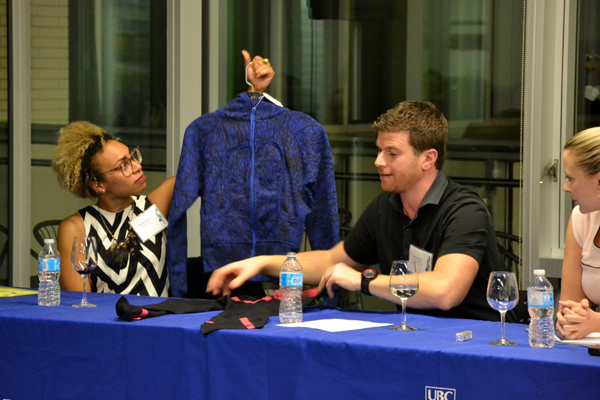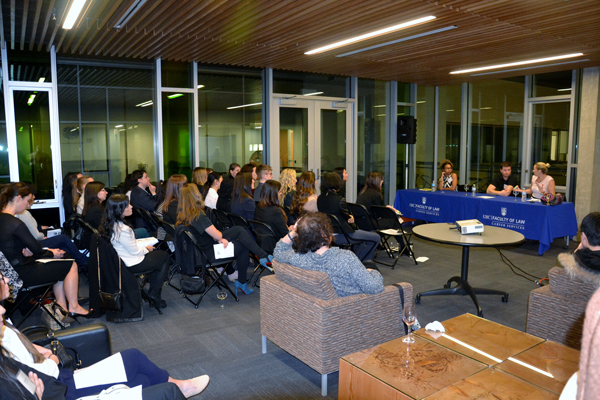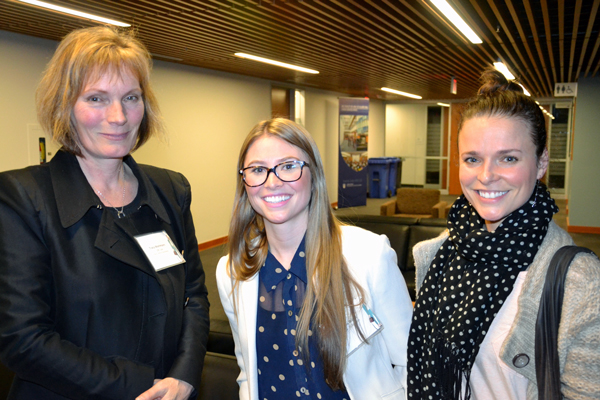… and have a competition to see whose profession has more television shows about it. The competition is naturally abandoned when they spot a teenage vampire sitting at one of the tables.
It isn’t news to anyone that law is among those professions widely depicted in popular television and film. Jim Carrey’s funnyman unwillingly stricken by his conscience; the owner of the best catch phrase in New Mexico, Saul Goodman; Reese Witherspoon’s insufferably pink Harvard superstar; all lawyers in massively popular works. I think this type of widespread and popular use of a profession is a sign that there are many stereotypes associated with it. Stereotypes allow people to rely on patterns, popular knowledge, audience familiarity, and make it easier to tell a story. (Who wants to spend 20 minutes of a movie explaining what a radiation technologist is?) Those stories in turn strengthen stereotypes, and on it goes.
It also isn’t news to anyone that some of the stereotypes associated with lawyers are negative. Since I have started law school, the question most often asked of me by others which hints at one of these negative stereotypes is this: well, would you actually defend someone you knew murdered another person? I then usually go into a monologue of Shakespearean proportions about the structure of the justice system; the adversarial system; Charter rights; duties of lawyers as officers of the court, as advocates for their clients, as members of a professional, regulated, honourable profession with codes of conduct; access to justice issues; discretion in choosing clients; and so on. I try to give nuanced and balanced answers to what are deceptively complex questions, in the hope that certain stereotypes are dispelled, or at least softened (or gladly denounced in exchange for me stopping said monologue).
I think one aspect of legal training that may put non-legally trained people off is the use of language. The corresponding stereotype is lawyers engaging in cold, calculated logic devoid of passion, and “twisting” words. Law and language- the written and spoken word- are inseparable. What do we law students do most of the time? We read. We read and write , then read some more. But so do poets, and there are hardly as many ‘poet jokes’ as there are ‘lawyer’ ones. So what is it about the way we deal with language which isn’t as appreciated by others? We are taught to use language precisely, technically, and most often frugally. We condense our notes. Then we condense those notes. Then we make one page cheatsheets. As lawyers, we will be responsible for every word we choose to put in a contract, say to a client, or utter in a courtroom. We also know that words with everyday meanings become entirely different beasts in the legal context, and for a lot of people, our insistence on differentiating between legal and non-legal meanings of words at all times can be annoying. Especially at dinner. (“Well mum, when you say ‘reasonable’…”) Since words like adrenocorticotropic hormone test and polycystic ovary syndrome don’t have everyday meanings, doctors for example are immune from this particular phenomenon. Perhaps then it is this careful, logical, pragmatic use of language and knit picking of words which makes it easy to attach this negative stereotype to the profession.
Law students have a host of stereotypes associated with them as well. If you type in ‘Why are law students’ into Google, the search engine helpfully suggests some endings for your question. I won’t reproduce those suggested endings here, but let’s just say that if you are a law student and need a pick-me-up, you shouldn’t do the aforementioned exercise.
This blog post isn’t an exercise in listing, promoting or combating any stereotypes, but more one of raising and pondering questions which I have found keep cropping up in my life as a law student. As I learn more about the law and the profession, I hope I can have better answers to questions about both, whether they are stereotypical or not. Maybe one day I can even deliver my monologue in iambic pentameter, matched to the footsteps of my dinner guest skipping away.




